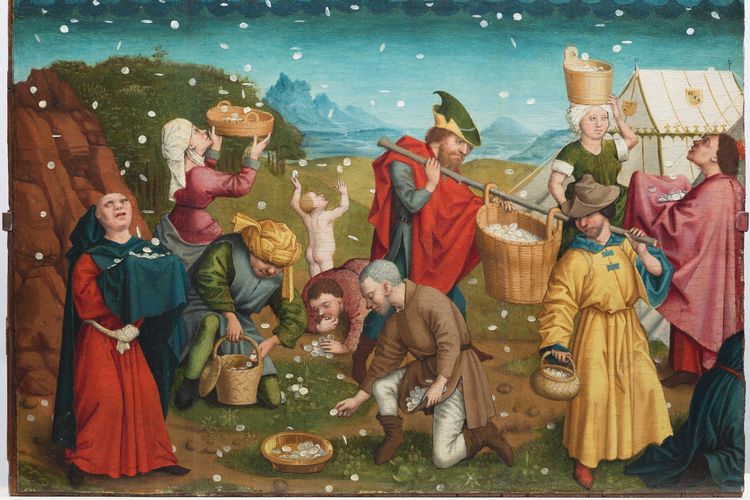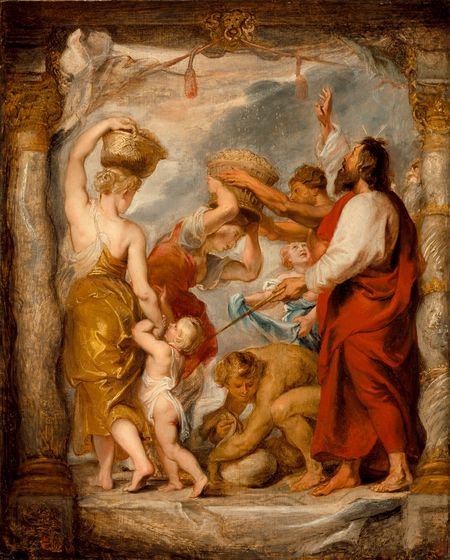The Manna Principle
- Details
- Category: Empire of Yahweh

The State of Food Security and Nutrition in the World 2021 Report published by the Food and Agriculture Organization (FAO) of the United Nations (UN) states below facts:
- Hunger: It is estimated that between nearly 800 million people in the world faced hunger in 2020. As many as 161 million more people were facing hunger in 2020 than in 2019. In 2030, the number of people facing hunger may be close to double the current population of the United States or triple that of Brazil.
- Inadequate Food: Beyond hunger, nearly one in three people in the world (2.37 billion) did not have access to adequate food in 2020 – an increase of almost 320 million people in just one year.
- Unhealthy Diet: Around 3 billion people, did not have access to a healthy diet due to its high cost, coupled with persistent high levels of income inequality, in every region of the world in 2019.
The World Health Organization Fact Sheet on Obesity and Overweight as of 9 June 2021 observes the following:
- Obesity and Overweight: In 2016, more than 1.9 billion adults, 18 years and older, were overweight. Of these over 650 million were obese. 39% of adults aged 18 years and over were overweight in 2016, and 13% were obese.
- Adverse Effects: Common health consequences of overweight and obesity are cardiovascular diseases (mainly heart disease and stroke), musculoskeletal disorders and some types of cancers.
- Fatality Rate: Most of the world's population live in countries where overweight and obesity kills more people than underweight.
- Unhealthy Diet: Globally, there has been an increased intake of energy-dense foods that are high in fat and sugars; and an increase in physical inactivity due to the increasingly sedentary nature of many forms of work, changing modes of transportation etc.
One of the first trials Yahweh administers the freshly minted Israelite society after their liberation from the Egyptian Empire is the Trial of the Manna. Let us consider the setting under which this testing is done. In the wilderness, the Israelites find themselves in a state of frustration and hunger due to a lack of food. It’s so bad that many among them go nostalgic about their times back in Egypt since they at least had food back then even though the Empire had oppressed them as slaves –
The whole congregation of the Israelites complained against Moses and Aaron in the wilderness. The Israelites said to them, “If only we had died by the hand of the LORD in the land of Egypt, when we sat by the fleshpots and ate our fill of bread; for you have brought us out into this wilderness to kill this whole assembly with hunger.”
Exodus 16:2-3
As Yahweh hears these complaints, he tells Moses he is going to rain down bread from the sky to satiate the people’s hunger, but adds a remarkable caveat that he has plans to test them with this food.
Then the LORD said to Moses, “I am going to rain bread from heaven for you, and each day the people shall go out and gather enough for that day. In that way I will test them, whether they will follow my instruction or not.
Exodus 16:4
So, what kind of food rains down from the heavens?
In the evening quails came up and covered the camp; and in the morning there was a layer of dew around the camp. When the layer of dew lifted, there on the surface of the wilderness was a fine flaky substance, as fine as frost on the ground. When the Israelites saw it, they said to one another, “What is it?” For they did not know what it was. Moses said to them, “It is the bread that the LORD has given you to eat"... The house of Israel called it manna; it was like coriander seed, white, and the taste of it was like wafers made with honey.
Exodus 16:13-15, 31
The people aptly name this mysterious food from the sky as ‘manna’, which essentially is a play on the phrase ‘What is it?’
But what is the test that Yahweh administers the Israelite people by means of the Manna? Well, it is multi-fold. He gives them specific directions regarding how the Manna should be collected and consumed. Those instructions go against the very fabric of imperial societies, and together they form the tenets of what can be defined as the Manna Principle.
-
Gather only what you need –
Everyone is expected to collect only what they need. Nothing more, nothing less.
-
- Test:
This is what the LORD has commanded: ‘Gather as much of it as each of you needs, an omer to a person according to the number of persons, all providing for those in their own tents.’”
Exodus 16:16 -
Test Result - Failure
The Israelites did so, some gathering more, some less. But when they measured it with an omer, those who gathered much had nothing over, and those who gathered little had no shortage.
Exodus 16:17-18
- Test:
-
Do not hoard –
Once gathered, the Manna is supposed to be consumed the same day. There’s strict prohibition on storing it overnight with an intent to consume it later.
-
- Test:
And Moses said to them, “Let no one leave any of it over until morning.”
Exodus 16:19 -
Test Result - Failure
But they did not listen to Moses; some left part of it until morning, and it bred worms and became foul. And Moses was angry with them.
Exodus 16:20
- Test:
-
Everyone should take a day off once a week from gathering it –
Just right about the weekend, there will be a double portion for everyone on Friday so that no one has to go out to gather it on Saturday - the day on which Yahweh calls a weekly mandatory Sabbath day of rest for every person in the community.
-
- Test:
"Six days you shall gather it; but on the seventh day, which is a sabbath, there will be none... The LORD has given you the sabbath, therefore on the sixth day he gives you food for two days; each of you stay where you are; do not leave your place on the seventh day.”
Exodus 16:26, 29 -
Test Result - Failure
On the seventh day some of the people went out to gather, and they found none. The LORD said to Moses, “How long will you refuse to keep my commandments and instructions?
Exodus 16:27-28
- Test:
While it is rather disheartening to see the people fail to live up to the ideals of these trials, one can understand the reason behind those failures, especially when considering the generations of lived experience they had had under the Egyptian empire, a society where sharing was not the norm, but hoarding and restless labor were the routine. As we analyze Yahweh’s commandments for the Manna, certain things become obvious on what he wants for his community -
- He clearly does not want food to be used as leverage by a few people to amass wealth and power over others – as it happened in the case of Joseph’s Egyptian Empire.
- He sees food as a basic right to everyone in the community and wants them to share it with each other and not hoard it for selfish purposes.
- He also sets the stage for a weekend in this newly formed society so that people can relax from any kind of work.
- This echoes his own day of rest after the creation of the universe (Genesis 2:1-3).
- Under the Empire, the only people who got such days of rest were the rich men who ruled over the masses. Yahweh’s Sabbath day of rest is revolutionary in the ancient world as it applies equally to everyone in the community. Male or female, master or servant, native or alien, adult or child, human or animal – everyone gets the day off. Equal rights for every living being!
Thus, guiding this fledgling Israelite community that wanders in the wilderness, far away from the influence of the Empire, Yahweh remakes the rules of civilization, subverting the ways of imperial society and overturning its norms on its head.
Read Next: The Sabbath Rest
